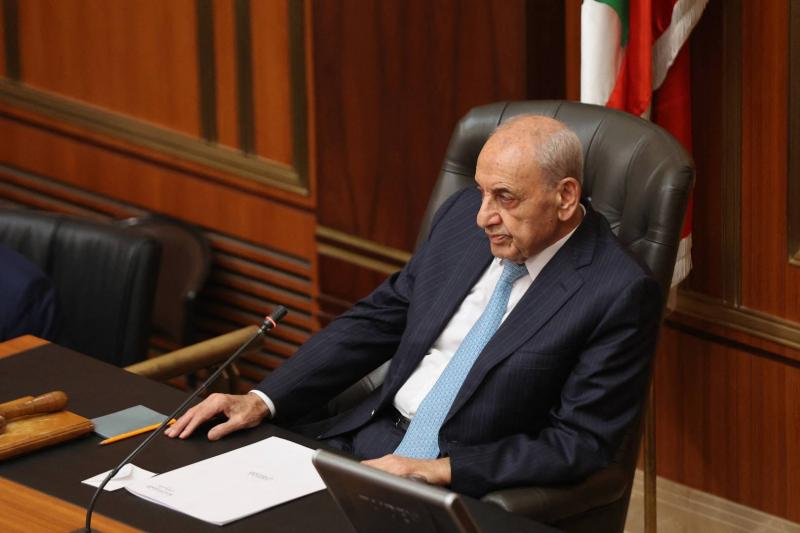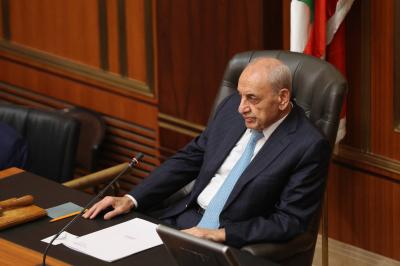The law extending the term of Army Commander General Joseph Aoun and other officers with the rank of Brigadier General has begun its path from the caretaker government to publication (possibly today) in the official gazette according to established procedures, to come into effect. The matter will be referred, within two weeks of its publication, to the Constitutional Council regarding the challenge to this law, prepared by the "Strong Lebanon Bloc." Meanwhile, the filling of vacancies in the military council remains pending, awaiting Defense Minister Maurice Sleem to present his proposals on this matter to Prime Minister Najib Mikati for consideration in the Cabinet.
While this extension has taken precedence in recent days over other internal files and has assumed a status of urgency and priority under the title of "preserving the military institution and ensuring its continuity while keeping it away from any disruption or confusion," its approval in the manner it was presented has awakened political enthusiasm to shift focus back to the "presidential priority" towards shaping a consensual outcome leading to the election of a president within the next few weeks, starting at the beginning of the new year. This is what must happen, as confirmed by Parliament Speaker Nabih Berri to "Al-Jumhuriya," considering that "the longer we delay the necessary consensus for electing a president, the more the complexities increase and the damages worsen, and thus it is absolutely no longer permissible, under the difficult circumstances that the region, including Lebanon, is experiencing, to keep this file in the square of provocations and obstructive conditions."
If Berri emphasizes that prioritizing the resolution of the presidential file is the foundation from which the new year should launch, Prime Minister Mikati shares this view, as Lebanon's condition and the surrounding circumstances necessitate it. Reliable information for "Al-Jumhuriya" confirms that the responsible political parties concerned with this entitlement, based on new developments either in the Palestinian arena or on the southern front, are genuinely concerned about the factor of time and possess a greater fear that the Lebanese reality, in its current abnormal presidential situation, will not be able to keep up with these developments and the facts that may arise later.
Deputy Speaker Elias Bou Saab conveyed from Speaker Berri his affirmation that "his main concern after the holidays is the election of the president, and this issue will be a priority for him until a president is elected." If these developments are expected to incentivize the parties in the presidential conflict to move in the opposite direction from the path of obstruction that has been adopted for nearly a year and two months, they do not seem to have brought rationality and realism to the obstructors' minds, as evidenced by the return of some parties to the same obstructive demands, insisting on controversial specifications for the future president and coloring them with certain political and partisan hues.
The bet here, as stated by responsible political sources, is on the anticipated external movement, whether from the Qatari or the French, who have informed the official levels in Lebanon of Paris's intention to launch a more vigorous qualitative movement than before after the New Year. French Foreign Minister Catherine Colonna warned that Lebanon is on the brink of difficult possibilities, and it must work to contain and prevent them, both by not escalating tensions on the southern border and by not delaying the election of a president. In this context, she revealed that the renewed French movement aims to facilitate consensus on electing a president at this time.
A responsible political figure noted, "Other countries are ahead of us in what we should be preceding them in," and told "Al-Jumhuriya": "Goodwill efforts are being exerted, and my information confirms that the Qataris will renew their endeavors in Beirut soon, and the French have indicated that they will take initiatives. In light of this effort, our role is to interact positively with the external effort and seize it by prioritizing the will for consensus, and the names of candidates are well-known; it is not necessarily about complete consensus, but on the feasible agreement to present one or two or more candidates to the Parliament, committing to ensuring the quorum for the session and continuing it until a president is elected."
In response to a question about whether consensus is possible, he said, "Consensus must happen and will happen in the end; the longer we delay it, the more we harm ourselves and buy detrimental things for our country for no reason, and this is our situation unfortunately." He added, "It is a mistake to say that we cannot reach a consensus; we have a successful experience in this regard that manifested just a few days ago in the session extending the term of the Army Commander and the officers with the rank of Brigadier General, which was achieved through consensus among different political directions. This consensus reached in the extension session can be replicated and applied to the session for the election of the president."
The same figure refrained from expressing premature optimism about the anticipated movement and merely stated: "They speak of a multiplied effort to shape a consensus that accelerates the election of a president; I will not preempt issues nor risk optimism, just as I will not risk pessimism. As long as the essence of the movement, as we've been told, is to help the Lebanese reach a consensus, this is an important opportunity that must be responded to." However, other political sources describe the anticipated movement as a "difficult mission," saying: "Regardless of the form and content of this movement, it faces an internal barrier still erected with the same obstructive conditions before any internal or external effort. The likelihood of breaking down this barrier is very weak in principle, as the thickness of this barrier is evident in that each party has yet to retract its candidate, considering them the most suitable for the presidency, and the greatest thickness is shown in the lack of will for consensus and unresponsiveness to any effort or call in this direction."




